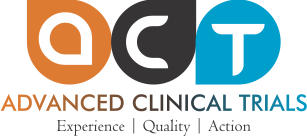Adaptive Monitoring:
Advanced technology implementation and clinical operations processes are giving a new definition to the Clinical research associate role. These changes are in turn reducing the costs and increasing the oversight of the clinical trial. At ACT, we are implementing a methodology called “Adaptive monitoring” that is proven to make the clinical trial a success without compromising on the quality of the data.
Our “Adaptive monitoring” methodology is enabling us to control the way we monitor our studies. Our patient enrolment at the site is the prime factor that triggers a monitoring visit at that site. By using this methodology we are eliminating waste by not over monitoring poor recruiting sites and monitoring based on facts..
Risk Based monitoring:
Our Clinical Monitoring Services (CMS) are custom-made to each client, based on the study protocol and client objectives. These solutions are accessible in a way that satisfies client needs, and our CMS gives the client peace of mind by providing real time status updates.
Our model is proved a success in efficiently managing the monitoring of clinical trials and registries. We provide face to face and/or online training to all our monitors which enables them hit the ground running. Our SOPs and sponsor SOPs are used by experts to conduct the clinical trial according to the protocol and following ICH-GCP guidelines.
There is increasing indication to show that centralised monitoring may be more effective in detecting non-compliance and data fabrication than even 100% SDV.
As Case Report Forms (CRFs) now being completed electronically, all the CRF data can be imported into a central File, along with the complete operational, quality, efficacy and clinical safety data from all sites, across multiple studies. The automated programs can be used to identify deviations in real time, impartially and with absolute accuracy
Different programs can be instructed to compare all the trial related data from across sites and indicate outliers above a pre-determined threshold or results that don’t fall into the expected pattern. Insufficient training, capability, competency, protocol noncompliance can all lead to protocol deviations. Our Programs are designed to predict and project these in competences. Risk based monitoring and centralised monitoring will help us identify problems early so that they can be resolved quickly, protecting patients and conserving the overall reliability of the study and Improves the efficiency of CRAs, as they concentrate on the sites that need help and allow competent sites to proceed without unnecessary interference.
Monitoring Strategy:
Our experts will provide you the right monitoring solution. Our solution will includes systems configuration, site visits, a source data verification plan, site-focused telephone-based support, management reporting and oversight. Our team of Clinical Research Associates (CRAs) are always available to support the sites and monitor the progress of the study. Custom-made to each customer and protocol, our site monitoring team ensures quality data is collected on-time and on-budget.
Monitors
Our team of CRAs are highly qualified and trained and lead by our clinical trial managers and project managers.
Site Managers:
Unlike other CROs, we enable our CRAs to serve as site managers. This guarantees strong site-CRA relationships and accelerates replies to issues raised during the monitoring visits. Our Clinical Trial teams can effortlessly escalate findings of inadequately monitored tasks, guaranteeing that the entire team is on the same page to to produce data with high quality. An established communication plan is used to provide trial progress to the sponsor for real time status reports and improved project management.
Involved from study start through site closure, Clinical Team will provide oversight by:
- Working together with sponsors and communicating every aspect of our monitoring activity throughout the engagement
- Keeping projects on time or ahead of schedule
- Supporting and Mentoring CRAs to ensure quality monitoring
- Collection of high quality clinical data
- Manage all site-related activities
- Proactively identifying and resolving study-related issues
